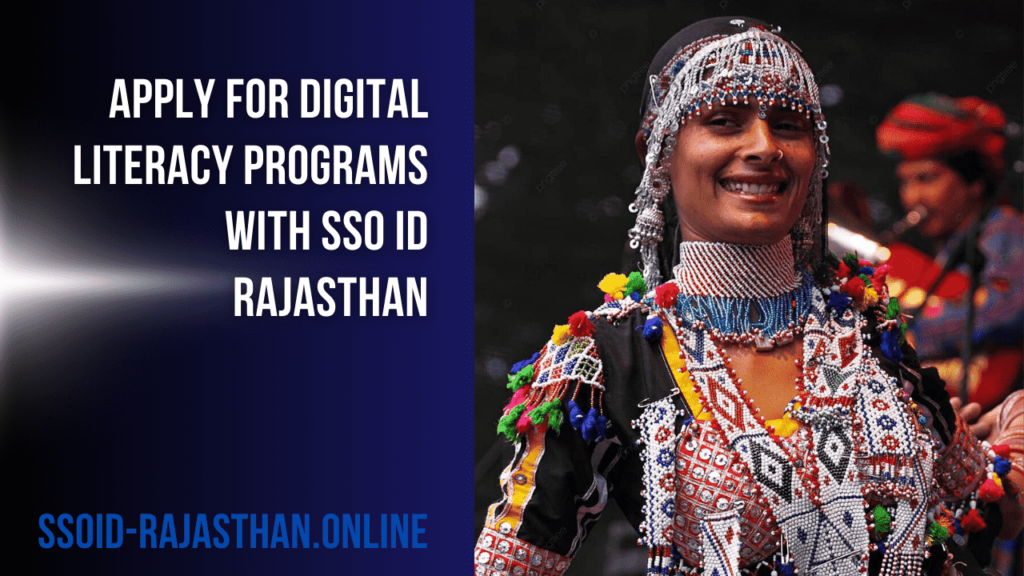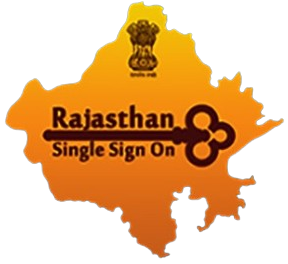Digital Literacy Programs with SSO ID Rajasthan are playing a pivotal role in bridging the digital divide across the state. By providing citizens with a unified platform to access a wide range of government services, these programs are not only simplifying administrative processes but also empowering individuals to participate more fully in the digital age. As Rajasthan pushes forward with its digital initiatives, understanding the factors that impact the success of these programs, from accessibility and infrastructure to education and security, becomes crucial for ensuring that every citizen benefits from this digital transformation.

Key Factors Impacting SSO ID Rajasthan and Digital Literacy Programs
1. Accessibility and Inclusivity
The effectiveness of SSO ID Rajasthan largely depends on the accessibility and inclusivity of the platform. While the system is designed to streamline access to government services, its success is contingent on citizens’ ability to navigate and utilize the platform effectively. Digital literacy programs are crucial in this context, as they ensure that all citizens, regardless of their socio-economic status, can benefit from the SSO ID system.
However, balancing accessibility with the complexity of digital platforms presents a challenge. Simplifying the user interface to accommodate users with low digital literacy levels may limit the platform’s functionality for more tech-savvy individuals. Conversely, a more complex interface could exclude those with limited digital skills, particularly in rural areas where access to digital literacy programs may be limited.
2. Infrastructure and Connectivity
Digital literacy programs in Rajasthan must contend with the state’s varying levels of infrastructure and internet connectivity. Urban areas typically enjoy better internet access and digital infrastructure, making it easier for residents to engage with the SSO ID system and participate in digital literacy initiatives. In contrast, rural areas may face significant challenges due to poor internet connectivity, inadequate digital infrastructure, and limited access to devices such as smartphones or computers.
These disparities create a digital divide that digital literacy programs must address. While efforts to expand digital infrastructure are ongoing, there is a pressing need to tailor digital literacy programs to accommodate the varying levels of infrastructure across the state. This requires a flexible approach that can adapt to the needs of different regions, ensuring that all citizens have the opportunity to develop the digital skills necessary to use the SSO ID system.
3. Education and Awareness
The success of SSO ID Rajasthan and digital literacy programs is also influenced by the level of education and awareness among the population. In areas where literacy rates are low, or where there is limited awareness of digital services, citizens may be hesitant or unable to engage with the SSO ID platform. To address this, digital literacy programs must go beyond teaching basic digital skills and focus on raising awareness about the benefits and uses of the SSO ID system.
Education campaigns that highlight the advantages of using SSO ID, such as time savings, ease of use, and access to a wide range of government services, can help drive adoption. Additionally, incorporating digital literacy into the formal education system can create a more digitally literate population over time. However, this requires significant investment in both resources and training, as well as collaboration between government agencies, educational institutions, and community organizations.
4. Privacy and Security Concerns
As with any digital platform, privacy and security are critical considerations for the SSO ID system. Users need to trust that their personal information is secure and that their privacy is respected when using the platform. Digital literacy programs must, therefore, include education on online safety, data privacy, and the importance of securing personal information.
However, ensuring privacy and security while maintaining ease of access can be challenging. Robust security measures, such as multi-factor authentication, may deter some users, particularly those with low digital literacy. On the other hand, inadequate security measures could expose users to risks such as identity theft or unauthorized access to personal data. Balancing these concerns requires careful planning and continuous monitoring of the platform’s security features.
Tradeoffs in Balancing Different Factors
Balancing the various factors impacting SSO ID Rajasthan and digital literacy programs requires careful consideration of tradeoffs. For example, while simplifying the user interface can make the platform more accessible to those with low digital literacy, it may also limit the functionality needed by more advanced users. Similarly, prioritizing privacy and security may require additional steps for users, potentially making the platform less user-friendly.
Moreover, efforts to expand digital literacy programs in rural areas may necessitate significant investment in infrastructure, which could divert resources from other important initiatives. Balancing these tradeoffs requires a strategic approach that considers both the short-term and long-term impacts on different segments of the population.
Challenges in Implementing SSO ID Rajasthan and Digital Literacy Programs
1. Resource Allocation
One of the primary challenges in implementing SSO ID Rajasthan and digital literacy programs is resource allocation. The state government must allocate sufficient resources to develop and maintain the SSO ID system, expand digital infrastructure, and deliver digital literacy programs across the state. This requires balancing the needs of urban and rural areas, ensuring that all citizens have access to the necessary resources.
However, limited budgets and competing priorities can make it difficult to allocate resources effectively. For example, investing in digital infrastructure in rural areas may be costly and time-consuming, but it is essential for ensuring that all citizens can benefit from the SSO ID system. Similarly, delivering digital literacy programs in remote areas may require additional resources, such as mobile training units or partnerships with local organizations.
2. Cultural and Social Barriers
Cultural and social barriers can also pose challenges to the success of SSO ID Rajasthan and digital literacy programs. In some communities, there may be resistance to adopting digital technologies due to traditional beliefs or a lack of trust in government systems. Additionally, gender disparities in digital access and literacy may limit the participation of women in digital literacy programs and their use of the SSO ID system.
Addressing these barriers requires a culturally sensitive approach that takes into account the specific needs and concerns of different communities. This may involve working with local leaders, conducting community outreach programs, and developing targeted initiatives to increase the participation of underrepresented groups, such as women and marginalized communities.
3. Sustainability and Scalability
Ensuring the sustainability and scalability of SSO ID Rajasthan and digital literacy programs is another challenge. While initial efforts may focus on rolling out these initiatives in key areas, there is a need to ensure that they can be sustained over the long term and scaled to reach all citizens across the state.
This requires ongoing investment in digital infrastructure, continuous updates to the SSO ID platform, and regular training for digital literacy educators. Additionally, the government must monitor the impact of these programs and make adjustments as needed to address emerging challenges and changing needs.
The Importance of Informed Decision-Making
The success of SSO ID Rajasthan and digital literacy programs hinges on informed decision-making that considers the various factors, tradeoffs, and challenges involved. By prioritizing accessibility, inclusivity, infrastructure development, education, privacy, and security, the state can create a digital ecosystem that empowers all citizens to participate fully in the digital economy. However, this requires a collaborative effort between government agencies, educational institutions, community organizations, and citizens themselves.
As Rajasthan continues to advance its digital initiatives, it is crucial to remain mindful of the diverse needs of its population and to make decisions that balance short-term gains with long-term sustainability. By doing so, the state can ensure that its digital literacy programs and SSO ID system serve as powerful tools for social and economic empowerment.
What are Digital Literacy Programs with SSO ID Rajasthan?
Digital Literacy Programs with SSO ID Rajasthan are initiatives aimed at educating and empowering citizens with the skills needed to effectively use the SSO ID platform. These programs teach basic digital skills, raise awareness about the benefits of digital services, and ensure that citizens can securely navigate online platforms.
Why are Digital Literacy Programs important for SSO ID Rajasthan?
Digital literacy is essential for the successful adoption of the SSO ID system. Without adequate digital skills, citizens may struggle to access and use the platform effectively. Digital Literacy Programs help bridge this gap by providing the necessary training and support to ensure that all citizens, regardless of their background, can benefit from the SSO ID system.
Who can benefit from Digital Literacy Programs with SSO ID Rajasthan?
Everyone can benefit from these programs, but they are particularly valuable for individuals with limited digital experience, such as older adults, people in rural areas, and those with lower levels of education. These programs are designed to be inclusive, ensuring that all citizens have the opportunity to develop the skills needed to use digital government services.
What challenges do Digital Literacy Programs face in Rajasthan?
Some of the key challenges include varying levels of infrastructure and internet connectivity across the state, cultural and social barriers that may hinder adoption, and the need to allocate sufficient resources to sustain and scale these programs. Additionally, balancing user accessibility with platform functionality and security is an ongoing challenge.
How do Digital Literacy Programs help in improving online security?
Digital Literacy Programs educate citizens about online safety, data privacy, and the importance of securing personal information. By raising awareness and providing practical guidance on these issues, these programs help users protect themselves from risks such as identity theft and unauthorized access to their data when using the SSO ID system.
What steps are being taken to improve Digital Literacy in rural areas of Rajasthan?
To address the digital divide, the government and various organizations are working to expand digital infrastructure in rural areas, provide mobile training units, and collaborate with local leaders to deliver digital literacy programs. These efforts aim to ensure that even the most remote communities have access to the necessary resources and training.
How can I enroll in a Digital Literacy Program with SSO ID Rajasthan?
Citizens interested in enrolling in a Digital Literacy Program can typically do so through local government offices, community centers, or online portals associated with the SSO ID Rajasthan initiative. Information about available programs and how to register is often provided through government announcements and community outreach efforts.
What are the future prospects for SSO ID Rajasthan and Digital Literacy Programs?
The future of SSO ID Rajasthan and its associated Digital Literacy Programs looks promising, with ongoing efforts to expand access, improve infrastructure, and tailor programs to meet the needs of diverse populations. As more citizens become digitally literate, the potential for widespread adoption of the SSO ID system increases, further enhancing the state’s digital ecosystem.
How can I stay informed about updates to SSO ID Rajasthan and Digital Literacy Programs?
To stay informed about updates, you can regularly check the official SSO ID Rajasthan website, follow government social media channels, and subscribe to newsletters or alerts from local government offices. These sources provide the latest information on new initiatives, program schedules, and any changes to the SSO ID system.
